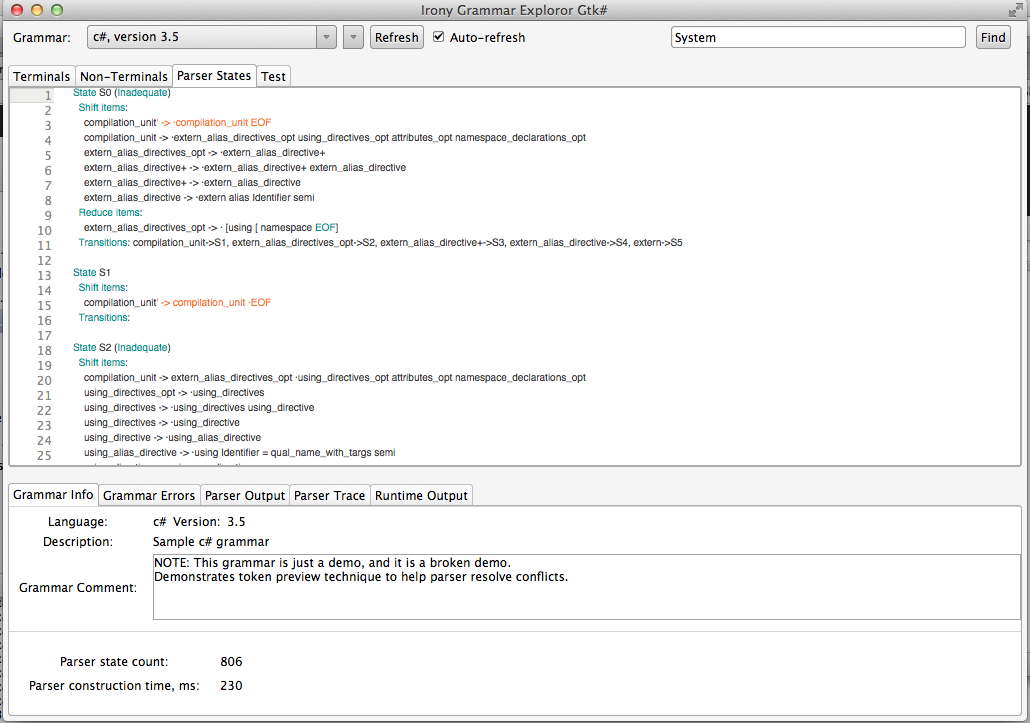1
2
3
4
5
6
7
8
9
10
11
12
13
14
15
16
17
18
19
20
21
22
23
24
25
26
27
28
29
30
31
32
33
34
35
36
37
38
39
40
41
42
43
44
45
46
47
48
49
50
51
52
53
54
55
56
57
58
59
60
61
62
63
64
65
66
67
68
69
70
71
72
73
74
75
76
77
78
79
80
81
82
83
84
85
86
87
88
89
90
91
92
93
94
95
96
97
98
| ometa BinaryParser <: Parser {
// Portable Network Graphics (PNG) Specification (Second Edition)
// http://www.w3.org/TR/PNG/
// Note: not all chunk are defined, this is just a POC
//entire PNG stream
START = [header:h (chunk+):c number*:n] -> [h,c,n],
//chunk definition
chunk = int4:len str4:t apply(t,len):d byte4:crc
-> [#chunk, [#type, t], [#length, len], [#data, d], [#crc, crc]],
//chunk types
IHDR :len = int4:w int4:h byte:dep byte:type byte:comp byte:filter byte:inter
-> {type:"IHDR", data:{width:w, height:h, bitdepth:dep, colortype:type, compression:comp, filter:filter, interlace:inter}},
gAMA :len = int4:g -> {type:"gAMA", value:g},
pHYs :len = int4:x int4:y byte:u -> {type:"pHYs", x:x, y:y, units:u},
tEXt :len = repeat('byte',len):d -> {type:"tEXt", data:toAscii(d)},
iTXt :len = repeat('byte',len):d -> {type:"iTXt", data:toShortAscii(d)},
tIME :len = int2:y byte:mo byte:day byte:hr byte:min byte:sec
-> {type:"tIME", year:y, month:mo, day:day, hour:hr, minute:min, second:sec},
IDAT :len = repeat('byte',len):d -> {type:"IDAT", data:"omitted"},
IEND :len = repeat('byte',len):d -> {type:"IEND"},
//useful definitions
byte = number,
header = 137 80 78 71 13 10 26 10 -> "PNG HEADER", //mandatory header
int2 = byte:a byte:b -> byteArrayToInt16([b,a]), //2 bytes to a 16bit integer
int4 = byte:a byte:b byte:c byte:d -> byteArrayToInt32([d,c,b,a]), //4 bytes to 32bit integer
str4 = byte:a byte:b byte:c byte:d -> toChunkType([a,b,c,d]), //4 byte string
byte4 = repeat('byte',4):d -> d,
END
}
BinaryParser.repeat = function(rule, count) {
var ret = [];
for(var i=0; i<count; i++) {
ret.push(this._apply(rule));
}
return ret;
}
toAscii = function(byteArray) {
var foo = String.fromCharCode.apply(String, byteArray);
console.log ("String:" + foo + " (...byteArrayOmitted...)");
return foo;
}
toShortAscii = function(byteArray) {
var embeddedText = String.fromCharCode.apply(String, byteArray);
// The iTxt chunk can contain a lot of text/xml, so truncate for proof of concept
console.log ("String:" + embeddedText.slice(1, 51) + " (...only first 50 bytes shown...)");
return embeddedText;
}
toChunkType = function(byteArray) {
var aChuckType = String.fromCharCode.apply(String, byteArray);
console.log ("ChunkType :" + aChuckType + " : " + byteArray );
return aChuckType;
}
byteArrayToInt32 = function(localByteArray) {
var uint8array = new Uint8Array(localByteArray);
var uint32array = new Uint32Array(
uint8array.buffer,
uint8array.byteOffset + uint8array.byteLength - 4,
1 // 4Bytes long
);
var newInt32 = uint32array[0];
console.log ( "i32 : " + newInt32 + " <= " + localByteArray );
return newInt32;
}
byteArrayToInt16 = function(byteArray) {
var ints = [];
alert(byteArray.length);
for (var i = 0; i < byteArray.length; i += 2) {
//ints.push((byteArray[i] << 8) | (byteArray[i+1]));
}
console.log (ints);
return ints;
}
fetchBinary = function() {
var req = new XMLHttpRequest();
req.open("GET","http://sushihangover.azurewebsites.net/Content/Static/IronyLogoSmall.png",true);
req.responseType = "arraybuffer";
req.onload = function(e) {
console.log("loaded");
var buf = req.response;
if(buf) {
var byteArray = new Uint8Array(buf);
console.log("got " + byteArray.byteLength + " bytes");
var arr = [];
for(var i=0; i<byteArray.byteLength; i++) {
arr.push(byteArray[i]);
}
// watch out if you uncomment the next line, it can kill your browser w/ large png files
// console.log(arr);
var parserResults = BinaryParser.match(arr, "START");
console.log(parserResults);
}
}
req.send(null);
};
fetchBinary();
|
 I was working on a Irony/C# based DSL that I wrote awhile back and noticed that I had some strange NameSpace issues with the GTK UI (exposed only within Xamarin’s Stetic Designer, not sure how those naming conflicts were not a compile time error…).
I was working on a Irony/C# based DSL that I wrote awhile back and noticed that I had some strange NameSpace issues with the GTK UI (exposed only within Xamarin’s Stetic Designer, not sure how those naming conflicts were not a compile time error…).

 I am assuming with removal of PlayScript’s public repo on GitHub that the project is either becoming a commercial offering from Xamarin (or Zynga) and future releases will have a license change?
I am assuming with removal of PlayScript’s public repo on GitHub that the project is either becoming a commercial offering from Xamarin (or Zynga) and future releases will have a license change?